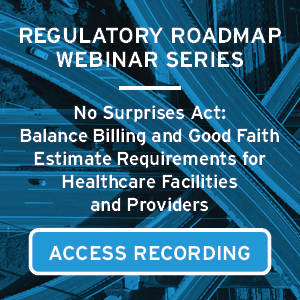 The Bass, Berry & Sims Healthcare practice presented the first installment of its Regulatory Roadmap Webinar Series on February 14, “No Surprises Act: Balance Billing and Good Faith Estimate Requirements for Healthcare Facilities and Providers.” Over 90 minutes, members Jeff Davis and Anna Grizzle provided an in-depth look at the compliance obligations for healthcare providers and facilities under the act and the regulations implementing it. This recap serves as an overview of the topics discussed during the webinar.
The Bass, Berry & Sims Healthcare practice presented the first installment of its Regulatory Roadmap Webinar Series on February 14, “No Surprises Act: Balance Billing and Good Faith Estimate Requirements for Healthcare Facilities and Providers.” Over 90 minutes, members Jeff Davis and Anna Grizzle provided an in-depth look at the compliance obligations for healthcare providers and facilities under the act and the regulations implementing it. This recap serves as an overview of the topics discussed during the webinar.
Signed into law in the waning days of 2020, the No Surprises Act (NSA) includes several consumer protections for both commercially insured patients and self-pay or uninsured patients. Many of the provisions went into effect on January 1, 2022. So far, the federal agencies implementing the law—the departments of Health and Human Services (HHS), Labor and Treasury—have issued two interim final rules with a comment period and one proposed rule. Not all of the rules governing how healthcare facilities and providers need to comply with the NSA are in place. (See more below on future rulemaking.)
The three key compliance requirements discussed during the webinar were:
- The ban on balance billing.
- Balance billing notice and disclosure requirements.
- Requirement to provide good faith estimates of expected charges to uninsured/self-pay individuals.
The Ban on Balance Billing
The NSA bans balance billing of commercially insured patients receiving care on an out-of-network (OON) basis in certain instances. The ban applies to emergency services furnished at OON emergency facilities or by OON providers and to non-emergency services furnished by OON providers at certain in-network (INN) facilities. Emergency services are defined broadly and can include certain services provided outside of an emergency department, in some cases.
In some cases, OON facilities and providers may be able to balance bill patients if they receive notice of their protections against balance billing and they provide consent to waive their protections and be balance billed. The notice and consent exception does not apply to pre-stabilization emergency services or certain ancillary services.
Notice and Disclosure Requirements
OON facilities and providers must notify payors whether a patient consents to be balance billed. OON providers must also notify payors whether services are furnished at an INN facility. The federal agencies encourage facilities and providers to include the notifications on the claim form itself and have sought suggestions from the industry on how best to accomplish this.
Providers and facilities that provide services subject to the ban on balance billing also must make broad public disclosure of patient protections from balance billing. These disclosures must be posted on the facility or provider’s website, displayed on-site, and provided to patients on a one-page notice. The disclosures must include applicable state-specific information and contact information for federal and state agencies a patient can contact if they believe their protections have been violated.
Good Faith Estimate of Charges for Uninsured/Self-Pay Patients
The NSA also includes consumer protections for uninsured or self-pay individuals. Facilities and providers must notify uninsured and self-pay patients of their right to request a good faith estimate (GFE) of expected charges for scheduled items or services and furnish a GFE upon scheduling or request. The GFE must include all services and items that are anticipated for the care being scheduled in a written form of the patient’s choosing—either on paper or electronically. The GFE regulations include separate requirements for the “convening” facility or provider who schedules the primary service that is the reason for the visit and any “co-providers” or “co-facilities” that are expected to provide services in conjunction with the primary service. Patients can dispute their bill if the charges are $400 or more above the GFE.
Anticipated Rulemaking
The federal agencies responsible for implementing the NSA have indicated that they expect to issue additional regulations to implement other provisions in the NSA, including:
- Requirement for facilities/providers to provide a GFE of expected charges for insured patients to the patient’s payor.
- Provisions to ensure continuity of care when there are terminations of contractual relationships that change a provider or facility’s network status.
- Accuracy of provider director information requirement applicable to payors.
- Advanced explanation of benefits requirement applicable to payors.
- Identification cards to be issued to patients by payors.
Click here to watch a recording of the webinar or reach out to Jeff or Anna with questions or concerns. The next webinar in the Regulatory Roadmap series is on April 7, 2022, and will focus on group practice pitfalls.


